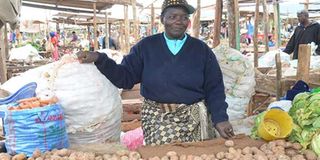Breaking News: At least 10 feared to have drowned in Makueni river
Food prices in Taita Taveta rise as long rains fail

Ms Grace Mutua sells potatoes at Taveta market in Taita Taveta County on April 23, 2019. She said prices have gone up due to the prevailing drought which has led to shortages in supply of crucial foodstuffs. PHOTO | LUCY MKANYIKA | NATION MEDIA GROUP
What you need to know:
- Irene Moto, a vegetable seller at the Voi upper market, said the delay in the fall of long rains has affected farming in the area.
- Sellers have said that they foresee acute food shortages if the area continues to witness poor rainfall patterns.
- Dealers in Voi are selling a 90kg bag of maize at Sh3,100 up from Sh2,900.
Food prices are on the rise in Taita Taveta due to the failed long rains, further rising the cost of living for poor households in the county.
Residents are now being forced to dig deeper into their pockets to access basic foodstuffs due to rise in their prices in local markets.
Cereals and vegetable sellers in the county revealed that prices have slightly increased, especially after the just concluded Easter holiday.
A kilogramme of sukuma wiki, spinach other vegetables increased to Sh100 from Sh70 while a kilogramme of tomatoes has gone up to Sh120 from Sh80.
Irene Moto, a vegetable seller at the Voi upper market, said the delay in the fall of long rains has affected farming in the area.
She said shortage of farm produce especially vegetables has made farmers to increase their prices.
TRANSPORT COSTS
“Some of the vegetables cannot be sourced within the county. We buy them from Ukambani region and that is why we are forced to increase the prices to cover for transport costs,” she said.
Shortages of maize and other cereals are already pushing up the prices.
Sellers have said that they foresee acute food shortages if the area continues to witness poor rainfall patterns.
Maize production in the area has dropped due to various factors including unpredictable rainfall, armyworm invasion and high costs of farming inputs.
Dealers in Voi are selling a 90kg bag at Sh3,100 up from Sh2,900.
One kilogramme of maize is now retailing at an average of Sh40 up from Sh35.
"The prices keep on increasing every time we get new stock. We get our maize from Taveta,” said a dealer in Voi, Cecilia Talu.
MAIZE FLOUR
In local supermarkets in Voi, Wundanyi and Mwatate towns, a two kilogramme packet of maize flour retails at an average of Sh130.
Mathenge Kamuzu, a farmer in Chala, said climate change has taken a toll on vegetable and maize farmers in the county.
He said those who depend on rain-fed agriculture to grow crops will not have a bumper harvest this season.
He also noted that water for irrigation has drastically reduced, further hurting the farmers.
Rivers Lumi and Njoro are now at below normal levels, mainly due to low rains in Taveta and neighbouring Tanzania.
“The situation is bad. We hope that the rains will come and things will change,” he said.
Taveta is the region’s food basket.
LOW HARVEST
Although it is too early to tell the outcome of the rains, predictions from the weatherman and agriculturalists show that the country will experience a below average harvest.
A financial expert, Cleophas Ngeti, said poor households are finding it difficult to afford basic foodstuffs due to the skyrocketing prices.
"Food prices have sustained an upward trend for the last two months. Families are now spending as much as twice what they used to spend two months ago," he said.
HUNGER SITUATION
County National Drought Management Authority Coordinator Samuel Githae said the situation will get worse if the rains fail to increase in the next one month.
He said so far, only 20,000 residents are facing hunger.
“If the rains fail to increase the number might go higher,” he said.
Apart from advising farmers to plant early maturing crops, the county government has also provided subsidised fertiliser in Taveta Sub-County.
“Farmers in the area can now access the fertiliser at Chala. We have also distributed early maturing green grams and sorghum to farmers,” said County Executive for Agriculture Davis Mwangoma.
Over 11,700 farmers have benefited from the programme.





